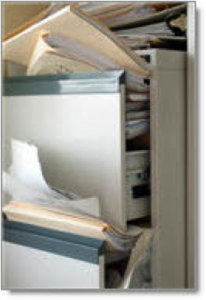
As we’re approaching the end of the year, it’s time to take a day and do what is called “the file clean out day”. Once you know what you have, you can make decisions on what to purge, save, and possibly scan or archive.
 Are you asking yourself, “what’s going on here?”. Consider what shape your filing system is in? Are your filing drawers stuffed so full that it’s nearly impossible to get another piece of paper into – or out of them? Are you hurting your knuckles every time you pull a file out? This time of year is a great time to review your files and purge as much as possible, creating space for next year’s papers.
Are you asking yourself, “what’s going on here?”. Consider what shape your filing system is in? Are your filing drawers stuffed so full that it’s nearly impossible to get another piece of paper into – or out of them? Are you hurting your knuckles every time you pull a file out? This time of year is a great time to review your files and purge as much as possible, creating space for next year’s papers.
If you’re using Paper Tiger Filing System Software for Document Management, it’s pretty easy, as all you need to do is run a “file clean out report” and review it to assist you in the process. Don’t use Paper Tiger? Here’s what you can do to get through all your old papers and prepare yourself for the new year. Then implement Paper Tiger so that this process will be simpler next year!
 While you’re in the mood to be cleaning out files, don’t forget your PC. It also has files that you no longer need, slowing down your processing of work.
While you’re in the mood to be cleaning out files, don’t forget your PC. It also has files that you no longer need, slowing down your processing of work.
You can run maintenance programs which can ‘defrag’ your files – in other words clean up and arrange them in a way which makes it easier for your PC to find and the speed for running programs will be improved.
Empty your recycle bin. When you delete a file, you are only moving it to the Recycle Bin. If you do not regularly empty your Bin, the files inside may take up valuable disk space. Oftentimes, people overlook this task. You should empty your Recycle Bin regularly, at least once a week. So if you haven’t been doing it, add it to your file clean out day.
Remove Temporary Files. Temporary or junk files are left over by programs and are usually no longer needed. Internet Explorer stores many of the files used on the web pages you visit so that next time you go to a site it doesn’t have to download the same files again. However, this can build up over time and take up a lot of disk space. They waste space and that may eventually slow your PC down.
Do you clean out your files every year? Let us know your process in the comment section below.
Anne McGurty is the president and CEO of Strategize and Organize, a training and consulting firm specializing in helping people perfect their environments and make better use of their resources – time, paper, and all forms of information management. As a productivity expert, Anne provides extensive customized services including business consulting, productivity training, process implementation, and time management seminars. You can also follow Anne on Facebook: http://www.facebook.com/strategizeandorganize
~~~~~~~~~~~~~~~~~~~~~~~~~~~~~~~~~~~~~~~~~~~
Tags: get organized, Paper Tiger "finding" filing system, Paper Tiger Online, Productivity, what to do with paper files
[...] -Anne McGurty, “Year-End Filing – The File Clean-Out Process” [...]